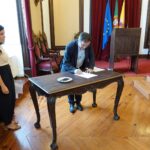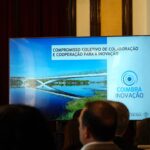Coimbra institutions collectively commit to territorial innovation
![[:pt][:en][:es][:fr][:zh][:]](https://d1yd5nm87cqjat.cloudfront.net/prod/baixa-coimbra/2025/07/24110655/1753351614-1024x576.jpg)
![[:pt][:en][:es][:fr][:zh][:]](https://d1yd5nm87cqjat.cloudfront.net/prod/baixa-coimbra/2025/07/24110655/1753351614-150x150.jpg)



Diverse Coimbra institutions signed a collective commitment today, July 14, to consolidate the Municipality as an innovative territory, both nationally and internationally, valuing active resources and strengthening synergy between entities. The signing of the Collective Commitment to Collaboration and Cooperation for Innovation in the Municipality of Coimbra – “Coimbra Inovação”, promoted by the Coimbra City Council (CM), takes place within the scope of the Municipal Innovation Strategy.
The session held today marked the consolidation of work carried out over nearly a year, marked by strong participation from the community and various local entities. The new document: “Technical Document for the Implementation of EMI”, drawn up in this context by the Coimbra Intelligence Centre of the Department of Information Technologies and Digital Innovation, reorganizes the contents relating to the action plan, governance model and commitment to innovation, now including 11 Anchor Actions (one more than in the base document), 10 Complementary Actions and various sub-actions.
Among the measures with the greatest transformative impact, five strategic initiatives stand out:<nbsp;Creation of the “Coimbra Inovação” website, Launch of the Coimbra Creative Hub;<nbsp;Expansion of #CoimbraCityLab;<nbsp;Implementation of a new integrated system to support investment in the municipality and Coimbra’s Application for the European Rising Innovative City award (iCapital Awards).
The activity of the #CoimbraCityLab will also be extended to matters related to citizen experimentation, “ecological regeneration, technological and social innovation and sustainable land use and the application of artificial intelligence for urban management”, this is another of the measures mentioned by the head of the Coimbra Intelligence Centre.
The digitization and qualification of municipal services, actions in territorial marketing and external communication, welcoming businesses and attracting investment, and the focus on sustainable and intelligent tourism are also actions planned in the EMI.
This “is another decisive step in the affirmation of Coimbra as a territory capable of reinventing itself, responding to the challenges of the present and positioning itself as a true hub of innovation”, said the deputy mayor, Francisco Veiga, today during the signing of the collective commitment to collaboration and cooperation for innovation in the municipality, entitled “Coimbra Inovação”.
“As of today, [the EMI] will be our bible”, stressed Francisco Veiga. With the institutions signed up, the project is now entering the “action phase”, in which the “convergence of wills” will “put Coimbra at the forefront of cities that are committed to innovation as a factor in economic, social and territorial development”.
To ensure the effective implementation of EMI, a robust and participatory governance model has been established, made up of five articulated structures:General Coordination, led by the Mayor;Advisory Structure, with entities from the innovation ecosystem;Specialized Coordination, ensured by the Municipal Service responsible for EMI;Execution, made up of operational teams from the municipal administration andMonitoring, coordinated by the municipal service designated to evaluate EMI’s performance.
Conceived as a living, collaborative and evolving process, the Municipal Innovation Strategy reflects a culture of sharing and collective intelligence at the service of the common good. For Rita Fernandes, head of the Coimbra Intelligence Center, “if everyone takes on their role in this mission, we will be transforming Coimbra into a true ecosystem of the future”.
The signing of the Commitment to Innovation symbolizes the collective will to prepare Coimbra for the challenges of the future, reinforcing its position as an innovative and resilient city.
LUSA/CM of Coimbra
Photographic credits: Coimbra City Council | João Paulo Silvano
